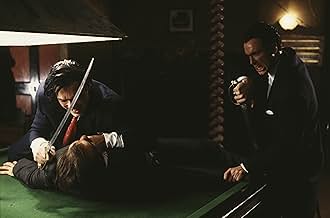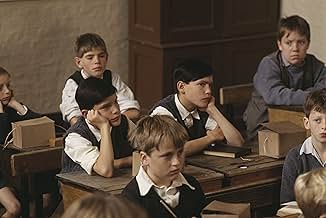This fact-based movie follows the life of the twin crime-lords in London's '60s underworld.This fact-based movie follows the life of the twin crime-lords in London's '60s underworld.This fact-based movie follows the life of the twin crime-lords in London's '60s underworld.
- Nominated for 1 BAFTA Award
- 4 wins & 2 nominations total
- Director
- Writer
- All cast & crew
- Production, box office & more at IMDbPro
Storyline
Did you know
- TriviaReggie Kray reportedly wrote regular fan letters to Martin Kemp.
- GoofsIn the boxing scene at the fairground, the twins' are portrayed as young adults and that the fight between them transpires after Ronnie knocks out the prize fighter - this incident actually took place when they were both small boys. The ringmaster shouted to the crowd if anyone wanted to take on the show fighter and the young Ronnie Kray shouted that he'd fight him. Amid much laughter, the referee pointedly said he was a bit young - whereupon Reggie stepped up and challenged his brother. They fought gamely, and were both awarded half a crown for their efforts; this was also the bout that led to their later semi-professional careers as pugilists.
- Quotes
Rose: I was on the bus the other day. And some old toerag was boasting about all he'd suffered during the war. Stupid old... I tell you, they don't know. It was the women who had the war - the real war. The women were left at home in the shit, not sitting in some sparkling plane or gleaming tank. There's no glamour for us. They should have been with me when old Pauline Woolley went in to labour. D'you remember that, Violet?
Violet Kray: Yes, yes I do, darling.
Rose: Seven hours of screaming down Bethnal Green bloody tube station. Then I had to cut the baby's head off - to save the mother's life. She died anyway, poor old cow. God, there was so much blood! Jesus! And the abortions. Those poor girls. One day they'll drain Victoria Park lake. And you know what they'll find? What glorious remnants of the Second World War? Babies, that's what. Bullets and dead babies. Men! Mum's right. They stay kids all their fucking lives. And they end up heroes - or monsters. Either way they win. Women have to grow up. If *they* stay children, they become victims.
- Alternate versionsThe infamous 'Chelsea Smile' scene was reduced in the UK cinema version but was later restored fully uncut for video releases after 2002.
- SoundtracksBittersweet
Written by Chris Rea
Published by Warner Chappels Music
By Arrangement with Chappell Music Ltd.
It was striking then how perfectly cast the Kemp brothers were, as the violent twins. Core members of the 1980's pop group Spandau Ballet, it was an eye-opener that they had another string to their bow and in contrast to their fresh pop image.
The film's aged well. Martin Kemp (Reggie Kray) kept up his acting career with popular soap operas (Eastenders) though I'm not sure what Gary (Ronnie Kray) has done since. They both have a slimy sort of adhesion as blood brothers and as the gangsters they both compel - and appal.
Billie Whitelaw's performance as their strong, iron-lady of a mother, Violet, who held the family together through the blitz and rationing, was always held in high esteem. The Kray men of that era come across as weak, ducking active war service and work, which embittered Violet, her mother and her sisters.
Thus, she had such high hopes for her twin boys. Bearing comparison to Margaret Wycherly's 'Ma' in the 1949 James Cagney crime thriller, 'White Heat' the bond becomes above all else. The apron strings are bullet proof, it would seem. Having somewhat grown up myself in the interim between viewings, I saw more into Kate Hardie's character who played Reggie's wife, Frances. Cast under a long shadow, below the 'Firm', Reggie's brother and certainly far below Violet, poor Frances, who annoyed me twenty years ago with her frightened whimpering excels at going from pretty girl-next-door, to trophy wife and then to tragic doormat.
Ronnie Kray's homosexuality, understandably back in the early-mid 1960's (and illegal) was cause of much of the ridicule and angst they endured from their enemies. Even back in 1990, it seemed daringly fresh to have this as part of the storyline, with scenes to match.
The film's direction and look cannot fail to be compared these days to Martin Scorsese, or, how he would have done it. This looks British; that grey-brown that these days would be digitally sourced. The acres of dull patterned wallpaper in front living rooms. The big Jaguar cars. The sun never shines in the East London street scenes, those streets seemingly familiar to Brits everywhere.
The dialogue at times seems naff and obvious, other times spot-on. Violence, when it comes is near-graphic, but maybe not up there with the barely watchable scenes of say, Scorsese's Goodfellas. I'd like to have seen more action - adding to its 115 minutes with more of the 'everyday' crime and racketeering and how they held down their much feared reputation. We do get a couple of brilliantly played nasty guys - Stephen Berkoff and Tom Bell are as despicable as any - and who have vengeance played upon them by the twins. We get no tip-offs and thus, no raids and no police. Some chase scenes might have been nice!
As a drama that reads more like a psychological profile than a straight crime thriller, then it's rarely been bettered, on either side of the Atlantic. Had it been made in the mould of the latter, then it might be better known and better remembered. I still like it, as it is, as much as I did twenty years ago.
- tim-764-291856
- Nov 9, 2010
- Permalink
- How long is The Krays?Powered by Alexa
Details
- Release date
- Country of origin
- Language
- Also known as
- Die Krays
- Filming locations
- Walcot Square, London, Greater London, England, UK(Reggie beats up men)
- Production companies
- See more company credits at IMDbPro
Box office
- Gross US & Canada
- $2,060,847
- Opening weekend US & Canada
- $948,002
- Nov 11, 1990
- Gross worldwide
- $2,060,847
- Runtime2 hours
- Color
- Sound mix
- Aspect ratio
- 1.85 : 1
Contribute to this page


























